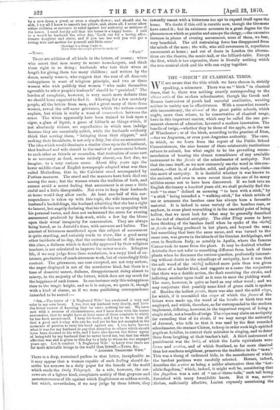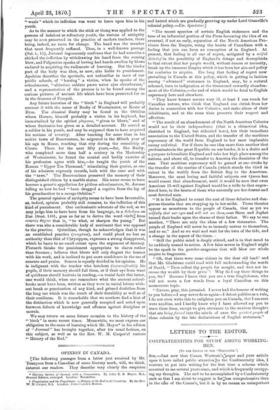THE " BIRCH " IN CLASSICAL TIMES.
AATE are aware that the title which we have chosen is, strictly V speaking, a misnomer. There was no " birch" in classical times, that is, there was nothing exactly corresponding to the ultima ratio of the modern schoolmaster, though the Greek and Roman instructors of youth had material auxiliaries, wanting neither in variety nor in effectiveness. With a somewhat remark- able inconsistency, the alumni of the great public schools, which ought, more than others, to be conservative of classical usage, have in this important matter, which may be called the one per- manent element of education, favoured a modern innovation. The bundle of twigs,—whether they be those of the apple, as is the use of Winchester; or of the birch, according to the practice of Eton, —has no Augustan, or even post-Augustan authority. The cane, to which, as we learn from the report of the Public School Commissioners, the nice honour of these aristocratic institutions refuses to submit, has what ought to be the prevailing recom- mendation of bearing the closest resemblance of any available instrument to the ferula of the schoolmaster of antiquity. Not that the cane itself, as we now commonly use the word in this con- nection,—that is, of a slender, solid, and pliable reed,—can claim this merit of antiquity. It is doubtful whether it was known to the ancients, and even in more recent times this one of its many utilities seems not to have been discovered. If we look into an English dictionary a hundred years old, we shall probably find the verb "to cane" defined as meaning "to beat with a stick," by "a stick" being intended a "walking-stick," for which article of use or ornament the bamboo cane has always been a favourite material. It is indeed in some variety of the bamboo cane, or anyhow, in some plant resembling it in the essential point of being hollow, that we must look for what may be generally described as the rod of classical antiquity. The elder Pliny seems to have been thinking of the bamboo itself when he spoke of the veyen or ferula as being produced in hot places, and beyond the seas; but something that bore the same name, and was turned to the same uses, was grown in the islands of the Grecian Archipelago, and even in Southern Italy, as notably in Apulia, where the famous Cannm took its name from the plant. It may be doubted whether Aristotle does not refer to something different from both of these plants when he discusses the curious question, profoundly interest- ing without doubt to the schoolboys of antiquity, how it was that the soft wood of the )404 inflicted more pain than was given by those of a harder kind, and suggests as a cause the conjecture that there was a double action, the flesh receiving the stroke, and inflicting another upon itself as it rose to meet the yielding wood. The cane, however, is quite as hard as any other wood; and we may conjecture that possibly some kind of green stalk is spoken of. Besides the hollowlerida, there -was also used the solid virga, for which, if it resembled the virgre of which the fasces of the lietors were made up, the wood of the betalla or birch tree was employed, and which, therefore, so far corresponded to the modern implement, differing, however, in the important respect of being a single stick, not a bundle of twigs. The virga may claim an antiquity far exceeding that of its rivals, if we may accept the authority of Juvenal, who tells us that it was used by the first recorded schoolmaster, the centaur Chiron, to keep in order such high-spirited pupils as Achilles, to correct their mistakes in singing, and to deter them from laughing at their teacher's tail. A third instrument of punishment was the 1/.64 of which the Latin equivalents were kraut and scutica, and of which Scotland, so far more classical than her southern neighbour, preserves the tradition in the " taws." This was a thong of undressed hide, in the manufacture of which the hardest portions were carefully selected. Horace, indeed, describes the scutica as being a milder alternative than the "hor- ribile flagellum," which, indeed, it might well be, considering that the flagellum was a sort of "cat-o'-three-tails," each tail being furnished with many formidable knots. But it was, never- theless, sufficiently effective, Lucian expressly mentioning the
" weals " which its infliction was wont to leave upon him in his youth.
As to the manner in which the stick or thong was applied to the persons of indolent or refractory youth, the custom of antiquity may be seen preserved in the practice of modern teachers, there being, indeed, no room for change. The hand was the member that most frequently suffered. Thus, in a well-known passage (Sat. i., 15), Juvenal ingenuously confesses that he had sometimes shirked the infliction by withdrawing his hand from the coming blow, and Fulgentius speaks of having had hands swollen by blows -endured in acquiring the rudiments of learning. But the hinder part of the body was then, as now, also liable to punishment. Apuleius describes the spectacle, not unfamiliar in most of our public schools, of " horsing " a victim, when he speaks of the achoolmaster, " altissime sublato puero nates ejus obverberans," and a representation of the process is to be found among the curious pictures of ancient life which have been preserved for us in the frescoes of Pompeii.
Any future historian of the " birch" in England will probably -connect it with the name of Busby of Westminster, or Keate of Eton. The classical Busby may be found in the Orbilius whom Horace, himself probably a victim in his boyhood, has immortalized by the epithet plagosus, "given to blows," and of whom Suetonius has given us a detailed account. He served as a soldier in his youth, and may be supposed thus to have acquired his notions of severity. After teaching for some time in his native town of Beneventum, he migrated in the fiftieth year of his age to Rome, reaching that city during the consulship of Cicero. There for the next fifty years,—for, like Busby, who completed more than half a century in the Mastership .of Westminster, he found the mental and bodily exercise of his profession agree with him,—he taught the youth of the Roman "Upper Ten Thousand," stimulating their genius, as one of his admirers expressly records, both with the cane and with the "taws." The Beneventines preserved the memory of their -distinguished citizen by a marble statue. His name seems to have become a generic appellation for pitiless schoolmasters, St. Jerome telling us how he had "been dragged a captive from the lap of this grandmother to a savage Orbilius."
The general opinion of antiquity seems to have been favourable, as, indeed, opinion probably still remains, to the infliction of this Cad of punishment. One enthusiastic advocate of the rod, as we may judge him to have been from his language, in a Scholium on Eur. Orest. 1481, goes so far as to derive the word CIPOn■ from i'icePokthpiV that is, "to whet, or sharpen the young." But there was also a considerable body of sentiment that was opposed to the practice. Q,uintilian, though he acknowledges that it was .an established practice (receptum), and could plead no less an authority than thht of Clirysippus, expresses a strong disapproval, which he bases to no small extent upon the argument of decency. Plutarch thinks the punishment appropriate to slaves rather than freemen ; believes that blows will only disgust the learner with his work, and is inclined to put more confidence in the use of censure and praise. Seneca is equally decided in his opinion. He is indignant with the teacher who butchers (excarnificabit) his pupils, if their memory should fail them, or if their eye from want -of quickness should hesitate in reading,—a venial fault this latter, -one would think, when one remembers what the ancient school- books must have been, written as they were in uncial letters with- out break or punctuation of any kind, and grimed doubtless from the long use which was the result of their durability as well as of their costliness. It is remarkable that we nowhere find a hint of -the distinction which is now generally accepted and acted upon between defects of knowledge and offences against discipline or morals.
We may return on some future occasion to the history of the "birch" in more recent times. Meanwhile, we must express our -obligation to the mass of learning which Mr. Mayor* in his edition of " Juvenal" has brought together, after his usual fashion, on this subject, as well as to the Rev. W. M. Cooper'st curious History of the Rod."































 Previous page
Previous page